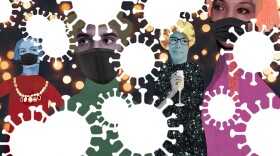
Maria Godoy
Maria Godoy is a senior science and health editor and correspondent with NPR News. Her reporting can be heard across NPR's news shows and podcasts. She is also one of the hosts of NPR's Life Kit.
Previously, Godoy hosted NPR's food vertical, The Salt, where she covered the food beat with a wide lens — investigating everything from the health effects of caffeine to the environmental and cultural impact of what we eat.
Under Godoy's leadership, The Salt was recognized as Publication of the Year in 2018 by the James Beard Foundation. With her colleagues on the food team, Godoy won the 2012 James Beard Award for best food blog. The Salt was also awarded first place in the blog category from the Association of Food Journalists in 2013, and it won a Gracie Award for Outstanding Blog from the Alliance for Women in Media Foundation in 2013.
Previously, Godoy oversaw political, national, and business coverage for NPR.org. Her work as part of NPR's reporting teams has been recognized with several awards, including two prestigious Alfred I. DuPont-Columbia University Silver Batons: one for coverage of the role of race in the 2008 presidential election, and another for a series about the sexual abuse of Native American women. The latter series was also awarded the Columbia Journalism School's Dart Award for excellence in reporting on trauma, and a Gracie Award.
In 2010, Godoy and her colleagues were awarded a Gracie Award for their work on a series exploring the science of spirituality. She was also part of a team that won the 2007 Nancy Dickerson Whitehead Award for Excellence in Reporting on Drug and Alcohol Issues.
Godoy was a 2008 Ethics fellow at the Poynter Institute. She joined NPR in 2003 as a digital news editor.
Born in Guatemala, Godoy now lives in the suburbs of Washington, DC, with her husband and two kids. She's a sucker for puns (and has won a couple of awards for her punning headlines).
-
As people use at-home rapid tests more and more, they're noticing some idiosyncrasies with the results. Here's the latest research examining the accuracy of these tests.
-
The CDC is expected to recommend that Americans to upgrade their masks to high-efficiency respirators. But how do you find one that fits you — and is legit?
-
Testing has become more important than ever as people try to get their lives back to normal. But what's the best way to get tested, which tests are best, and are rapid antigen tests even accurate?
-
The omicron variant is so contagious that researchers who study transmission say consumers should consider wearing N95s and taking a rapid COVID test shortly before gathering with friends and family.
-
You might want to cancel that holiday party, and definitely dust off your face mask. Don't panic, but do step up your precautions. Here's how.
-
Chile has started vaccinating kids age 6 to 11 against COVID, one of the few nations in the world to immunize kids under 12. A handful of other countries are also giving shots to younger kids.
-
A COVID outbreak in a California elementary school has highlighted how formidable a foe delta is in classrooms. That's why experts say it's vital schools deploy multiple strategies to curb cases.
-
Emerging data suggest children gained excess weight during the pandemic. Parents can follow some tips on how to get their kids back to being active and healthy.
-
New data on the Delta variant has researchers wondering what the mutation could mean for the evolution of COVID-19 as it continues to spread.
-
A key CDC advisory panel presented evidence that an additional shot could boost the chances that people with weakened immune systems will get a protective response. Right now, such use isn't allowed.
-
There were recalls of some sunscreen and after-sun products last week when testing revealed the presence of a carcinogenic chemical.
-
Vaccination rates have stalled across the U.S., but are on the rise among Latinos. That's thanks in part to volunteer promotoras — foot soldiers known as health promoters.

